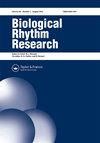一晚的完全睡眠剥夺会损害优秀功夫运动员的决策能力、无氧表现、情绪状态和知觉反应
IF 0.9
4区 生物学
Q3 BIOLOGY
引用次数: 2
摘要
摘要探讨24名优秀功夫运动员(年龄:20.2±1.76岁;体重:64.67±6.52公斤;身高:1.71±0.04米)一夜完全睡眠剥夺(TSD)对认知和身体表现以及主观体验的影响。参与者在正常睡眠(NS)和TSD条件下,按照随机平衡顺序,在下午晚些时候完成了两次测试(间隔72小时恢复)。评估了具体的决策技能(决策准确性(DA)和决策时间(DT))、各种无氧运动表现(即坐式健身球投掷(SMBT)、水平跳跃(HJ)、垂直跳跃(VJ)、等长背部肌肉力量(IBMS)和等长腿部肌肉力量(ILMS))、情绪状态和感知反应(注意力和注意力)。与NS相比,TSD与较低的活力值和较高的焦虑、抑郁、疲劳、愤怒、困惑和总体情绪障碍值相关。与NS相比,TSD导致注意力和集中度降低。同样,与NS相比,TSD后SMBT、HJ、VJ和ILMS的性能较低。对于认知表现,与NS相比,TSD导致更高的DA和更低的DT。总之,一晚的TSD会通过情绪和注意力能力的紊乱,对功夫精英的决策和无氧表现产生负面影响。本文章由计算机程序翻译,如有差异,请以英文原文为准。
One night of total sleep deprivation impairs decision-making skills, anaerobic performances, mood states, and perceptual responses in elite Kung-Fu athletes
ABSTRACT To explore how one night of total sleep deprivation (TSD) could affect cognitive and physical performances, as well as subjective experiences in 24 elite Kung-Fu athletes (age: 20.2 ± 1.76 years; body mass: 64.67 ± 6.52 kg; height: 1.71 ± 0.04 m). Participants completed, in a randomized counterbalanced order, two tests sessions in the late-afternoon (separated by 72-h recovery) under normal sleep (NS) and TSD conditions. Specific decision-making skills (decision accuracy (DA) and decision time (DT)), various anaerobic-exercises performance (i.e. seated medicine-ball throw (SMBT), horizontal jump (HJ), vertical jump (VJ), isometric back-muscles strength (IBMS), and isometric leg-muscles strength (ILMS)), mood states, and perceptual responses (attention and concentration) were assessed. The TSD was associated with lower values of vigor, and higher values of anxiety, depression, fatigue, anger, confusion, and total mood disturbance, compared to NS. The TSD resulted in lower attention and concentration, compared to NS. Similarly, lower performances of SMBT, HJ, VJ, and ILMS were recorded after TSD compared to NS. For cognitive performances, the TSD resulted in higher DA and lower DT, compared to NS. In summary, one night of TSD elicits negative effects on decision-making and anaerobic performance in Kung-Fu elites through disturbances in mood and attentional capacities.
求助全文
通过发布文献求助,成功后即可免费获取论文全文。
去求助
来源期刊

Biological Rhythm Research
生物-生理学
CiteScore
3.00
自引率
9.10%
发文量
34
审稿时长
6-12 weeks
期刊介绍:
The principal aim of Biological Rhythm Research is to cover any aspect of research into the broad topic of biological rhythms. The area covered can range from studies at the genetic or molecular level to those of behavioural or clinical topics. It can also include ultradian, circadian, infradian or annual rhythms. In this way, the Editorial Board tries to stimulate interdisciplinary rhythm research. Such an aim reflects not only the similarity of the methods used in different fields of chronobiology, but also the fact that many influences that exert controlling or masking effects are common. Amongst the controlling factors, attention is paid to the effects of climate change on living organisms. So, papers dealing with biometeorological aspects can also be submitted.
The Journal publishes original scientific research papers, review papers, short notes on research in progress, book reviews and summaries of activities, symposia and congresses of national and international organizations dealing with rhythmic phenomena.
 求助内容:
求助内容: 应助结果提醒方式:
应助结果提醒方式:


